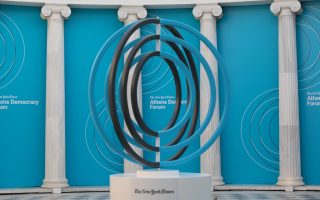Improving and strengthening the city through cooperation

On the fourth floor of the Romantso building on Anaxagora Street, there is a well-hidden “factory” hard at work, weaving together a new Athens. Known as the Athens Partnership (AP), this is an independent nonprofit organization working to bring together municipal services, charitable foundations, nonprofit organizations and private companies to spark innovation in the technology, culture, education and social welfare sectors.
AP, which was established by the City of Athens in late 2015 as an initiative of Mayor Giorgos Kaminis, has become an international model of good practices in addressing the needs and problems of a complex (and at times chaotic) city such as Athens.
Passion and drive
Αs they celebrate the release of their first official biennial report, AP staff – including executive director Alexandros Kambouroglou, communications manager Alexandros Kandarakis, financial director Alexis Filias and office manager Dimitris Grigoriadis – invited Kathimerini to their offices to share more about their programs, their approach and what motivates them.
AP brings together the public and private sectors, public servants, and people who want to contribute to the improvement of public services to facilitate cooperation between existing municipal services with the additional know-how and resources of the private sector. The Athens Partnership also works as an incentive for strengthening the capacity of the state. As Kambouroglou puts it: “We enable people with the help of the private sector. You should be there to watch the way municipal services are transformed. The motivation is exponential.”
This multiplier effect is exactly what the Athens Partnership is investing in. In the words of Kambouroglou, “Since the end of 2015, AP has been working to facilitate municipal services through the use of new models and, above all, the introduction of a new mind-set in terms of their effectiveness; AP helps to activate municipal and city forces while building new relationships between citizens, public space and public affairs in general.”
AP programs include Open Schools – recently honored by the Council of Europe as a model of good practice for personal and group development for all ages; Designed for Better Learning – focused on innovation in education; the Athens Coordination Center for Migrant and Refugee Issues – a large network of 11 cities; SynAthina – an award-winning platform which brings together citizens’ groups; the Kypseli Municipal Health Clinic – a model clinic with a holistic approach; I Serve – a social services network; Social Integration – providing help for vulnerable groups; I Care – a single database for better provision of social services; the Commercial Triangle project – transforming a neighborhood in the city center; Athens Culture Net – bringing together major cultural foundations and institutions in Athens; Athens Tourism Partnership – in cooperation with Aegean Airlines and Athens International Airport; and Digital Athens – designed to turn Athens into a smarter city, with the participation of major technology and communication companies.
Perhaps more important than the programs themselves is the interdependence between them – the way they are woven together. “We have created a prototype model through which a private individual can offer targeted charitable work. Athens Partnership offers donors the opportunity to invest their money in the priorities set by the municipality for the benefit of the city and its citizens and not blindly,” says Kambouroglou. From November 2015 to December 2017, the Athens Partnership received 8,299,206 euros in support and spent 6,765,534 euros on programs, fund-raising, and administrative and operating expenses, leaving a remaining balance of 1,533,675 euros. Future programs will include the introduction of a city street-cleaning program (Clean Streets), the installation of fiber-optic network connections in all Athens schools, the replication of I Serve in additional municipalities in Attica, and the remodeling of Designed for Better Learning for more schools in the city of Athens.
An inclusive organization
“What we are proud of – and which makes us passionate – is the new project management model, with reports and responsibilities, which we will eventually pass down to municipal and public services. We aspire for this dialogue, this effort, to be as inclusive as possible, involving public agencies, citizens and institutions,” Kambouroglou told Kathimerini, appearing to describe a model that legitimately bypasses the imposed bureaucracy of a slow-moving and tired public sector.
This is also evident from the comments of Bloomberg Associates consultant Megan Sheekey, who has worked with the City of Athens, helping with strategy and the implementation of the Athens Partnership. Sheekey said: “This new vehicle allows the city to test and evaluate new service delivery models and programs by leveraging both public and private resources. These projects not only enhance the municipal structures and processes, but also integrate international best practices into the framework for future investment in Athens.”
Opening the city to all
On an ordinary Wednesday in mid-July, Kathimerini photographer Nikos Kokkalias captured a photo of children playing in the shared yard of five municipal kindergartens in Ambelokipi: Sevastoupoleos, Christodoulakio, Mikro Christodoulakio, Kifissias I and Kifissias II. The children’s joyful voices served as a testament to the success of the Designed for Better Learning conversion of the schools’ five separate playgrounds into one, single, upgraded complex. Marianthi Liapi from the Technical University of Crete, who is project manager for Designed for Better Learning (funded by an exclusive grant from the Stavros Niarchos Foundation), explained: “Our collaboration with the Athens Partnership gave us the opportunity to develop the innovative Designed for Better Learning program, which is a practical, large-scale implementation of both an architectural and a pedagogical approach. Although the substantial upgrade of 24 schools in the City of Athens was a great challenge, having the school community and the municipality on our side helped to change the relationship between children and teachers with their school. The result was a successful program, tailored to the needs and capabilities of Greece.”
A few minutes later, we got a chance to see the Open Schools program in full swing. The 135th Primary School of Athens in Gyzi, one of the 25 Open Schools, was open for summer camp, hosted by a theater group called “Fairy Tale from Afar.” The room was abuzz with small children rearranging pieces of scenery and practicing their lines, as a large school space finally fulfilled its purpose: becoming part of the entertaining and educational learning process. According to the data, 2,400 children participated in these types of summer camps this year, with a total of 26,955 people taking part in 414 activities hosted by 146 city institutions since 2016. In addition to summer camps, Open Schools also offer foreign language classes in Greek, English, Arabic, Farsi and Turkish; science, technology, mechanics and mathematics educational courses; startup training for local businesses, as well as individual job preparation.
A hub of innovation
That afternoon we toured one final location: the Maker Space at the Serafeio Complex – a major innovation hub in the city of Athens. In addition to its educational programs, this experimental technology space supports the innovative ideas of citizens who aim to transform Athens into a “smart city,” bringing people’s technological dreams to life. Offering 3D printers, fast network connections and other state-of-the-art technology, the only prerequisite to use the space is that work be designed to achieve serious business targets, focused on returning profits to society as a whole. Educational resources are linked to the free market through a municipal platform; with these resources students’ learning process is enriched and teachers are provided with new classroom resources, while young entrepreneurs devise, propose, test and implement their ideas.
Moving forward
During our discussion, AP executive director Alexandros Kambouroglou comes back to the work of the Athens Coordination Center for Migrant and Refugee Issues, which has built a network of cities working together to better manage refugee issues. Participating municipalities include Iraklio, Thessaloniki, Ioannina, Karditsa, Larissa, Livadia, Nea Philadelphia, Piraeus, Trikala and Tripoli. Opened in June 2017 with funding support from the Stavros Niarchos Foundation, today it comprises 88 member institutions. “Athens has a plan for migrant and refugee issues,” says Kambouroglou. “We have evaluated and submitted 65 pilot proposals and we have built preparedness mechanisms for multiple scenarios.”
Modern solutions and opportunities for all
“The Athens Partnership is an innovation we brought to the City of Athens in 2015 to overcome bureaucratic obstacles and quickly realize innovative programs for the citizens of Athens. We have provided modern solutions and opportunities for everyone in sectors such as education, entertainment, city revitalization and social solidarity, and we already have tangible results. This is what I mean when I say that we have implemented a different, flexible, and at the same time transparent governance model in the largest municipality in the country. A new mind-set, in which we have trustworthy businesses, leading universities, the country’s important charitable institutions and, of course, the citizens themselves who want to make a difference for their city,” said Mayor Kaminis.
Sponsors of the Athens Partnership include the Stavros Niarchos Foundation (lead donor), Accenture, Bloomberg Associates, Bloomberg Philanthropies, Cosmote, Drake & Maria Behrakis, Edenred, The Hellenic Initiative, House Market SA (IKEA), The Libra Group, the Latsis Foundation, Microsoft, Nokia, the Onassis Foundation, Open Society Foundations, Piraeus Bank, Solidarity Now, Taxibeat, Vodafone and the Yale Concert Band.





